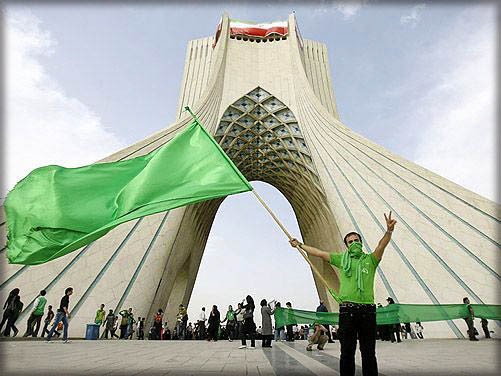From Tunisia/Egypt to Libya/Iran: Notes of Caution on Sudden Change
 Thursday, February 24, 2011 at 7:20 |
Thursday, February 24, 2011 at 7:20 |  James Miller in
James Miller in  Africa,
Africa,  EA Global,
EA Global,  EA Iran,
EA Iran,  EA Middle East and Turkey,
EA Middle East and Turkey,  Middle East and Iran
Middle East and Iran  The time of uprising could be measured in a few weeks, or days, or even hours.
The time of uprising could be measured in a few weeks, or days, or even hours.
Before 14 January, most Americans didn't know Tunis from hummus. But suddenly the Tunisian regime fell, and President Zine Abedine Ben Ali quickly ended 27 years of rule by fleeing to Saudi Arabia.
Two weeks later, US President Barack Obama gave his State of the Union address. He did not mention the word "Egypt". Three days later, every American was glued to a TV set to witness the final hours of President Hosni Mubarak's 30-year reign.
It happens that fast, and the whole world changes. Groups of dedicated and peaceful protesters join together, use technology to spread their voices, and bring down dictatorships.
Well, Mubarak's demise is almost two weeks old. We are impatient for the next regime to fall. It could Libya, or Bahrain, or Iran, or maybe Yemen. It should happen any day now, right?
A step back. Many of the assertions above are completely, or partially, inaccurate. The spark for what appeared to be an overnight revolution in Tunisia came almost a month earlier when Mohamed Bouazizi, a street vendor, lit himself on fire after having his merchandise confiscated by a municipal officer. But before this, there were years of economic and social oppression to drive Bouazizi to his self-immolation and to push others to the streets.
In Egypt, websites had been following the political degradation for at least a year. There were serious signs of trouble, long before the main stream media followed the story, with rigged elections, persecution of political dissent, beatings and killing by police, and bombings slowly eating away at Mubarak's credibility.
But the more critical misconception about these first two revolutions may be that the protesters in Tunisia and Egypt somehow toppled their dictators. While the protesters in both locations may have been the catalysts for change, they were not its agents. In both nations, members of the government and leaders of the military stepped in on behalf of the people on the ground. Dissent from within their establishments forced both Ben Ali and Mubarak into a corner. They would have to make a choice: face a bloody civil war and coups d'état, or step down.
Libya is not Egypt or Tunisia. Muammar Qaddafi has no centralized government, has no institutions, and has few rivals inside his own government or military. This is why were are seeing a very different pattern in Libya. The protesters are physically taking control of the country, not just a single square, and they are sometimes doing so by force. Each man employed by the Libyan state is being forced to pick sides. Many are joining the protests, but there is no other way for this to play out than violent revolution. There is no government, to speak of, to hold a gun to the back of the dictator's head.
Iran is also not Tunisia or Egypt, but for different reasons. The identity of the post-1979 pro-regime Iranian is closely tied to the idea that the current theocratic government is the culmination of the Islamic Revolution. Following orders, cracking down on dissenters, and maintaining loyalty to the Supreme Leader is almost an obligation. This is in sharp contrast to Egyptian and Tunisian societies, far more permissive despite their repression of political rivals or freedom of expression.
So far, this has been a difficult identity to change. However, over the last 20 months, more and more of the regime's support has been eroding, and the cracks are beginning to show. Last week's defection of an Iranian diplomat in Milan was the latest in a series of defections. Members of the establishment are debating how to best handle the opposition movement, as hard-line loyalists to the regime call for the death of reformist leaders and moderate conservatives push back.
But to this point, the ideology of the Islamic Republic has held out. the Revolutionary Guard and the military have remain loyal, and the world has watched as the police and the basij have beaten and arrested the protesters. The strength of Iran's military establishment is unparalleled in the region, and its leaders have been consolidating power for 30 years. Add to this formula the perceived need to defend against the omnipresent enemy of the West, and it becomes apparent that Iran has the military order of an Egypt, but with greater loyalty. It has the ferocity of the Libyan regime, but with more political savvy.
The protesters are still showing up, still chanting, still marching, but as the old adage goes, words do not break bones. Events will move to the breaking point, when someone holds a gun to someone else's head, and everyone is forced to react. With Mir Hossein Mousavi under house arrest, Mehdi Karroubi under the constant guard of security forces in his own home, Hashemi Rafsanjani's power being challenged on the Assembly of Experts, Mahmoud Ahmadinejad's term expiring, and the 2009 spirit of dissent reviving, the question is when that point is reached.
The earthquakes of Egypt and Tunisia built up for a long time on softer ground. It has taken, and will take, much longer for the fault lines to break the foundations of Iran's government. When it happens, the regime is likely to go quickly, and like a high-magnitude earthquake, the results will be felt far and wide.
We're already feeling the foreshocks, but the whole world is waiting for the big one.

Reader Comments